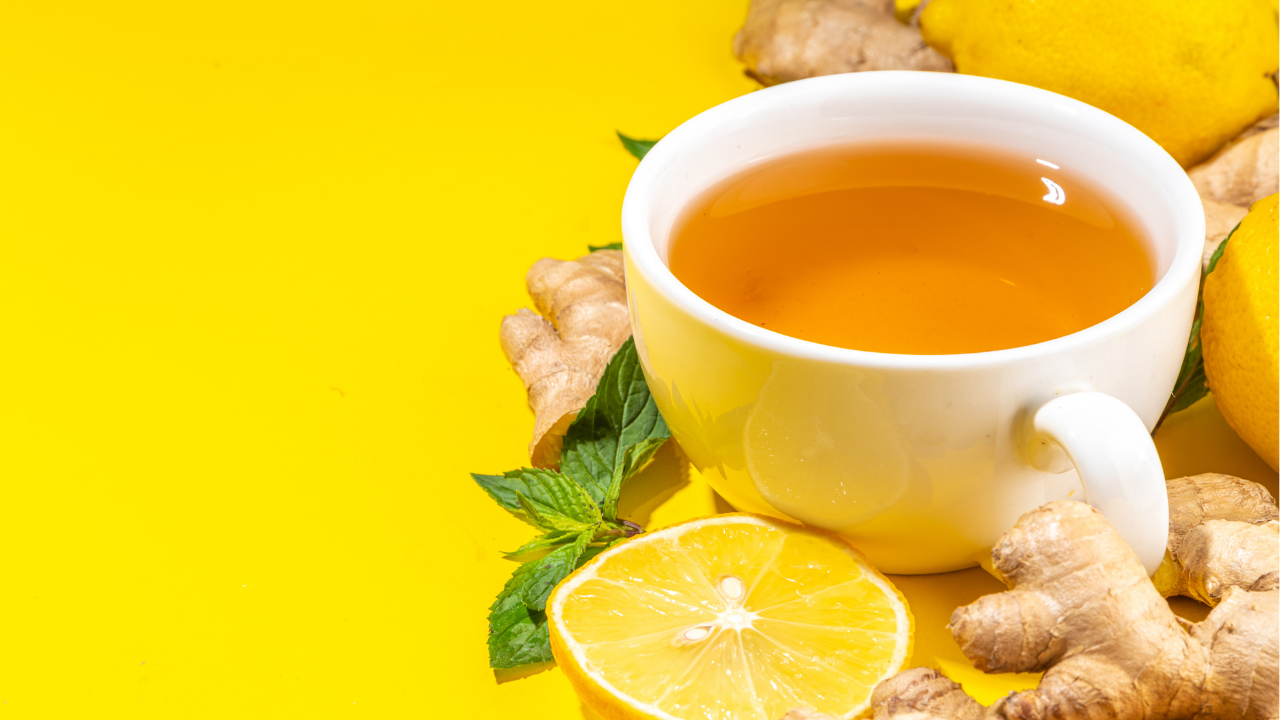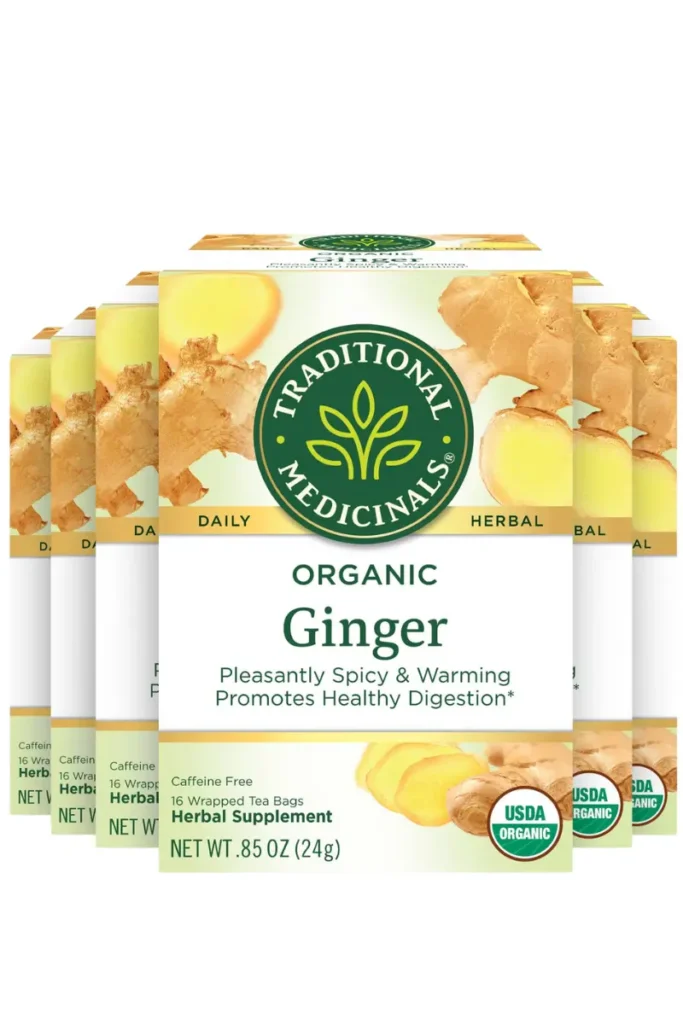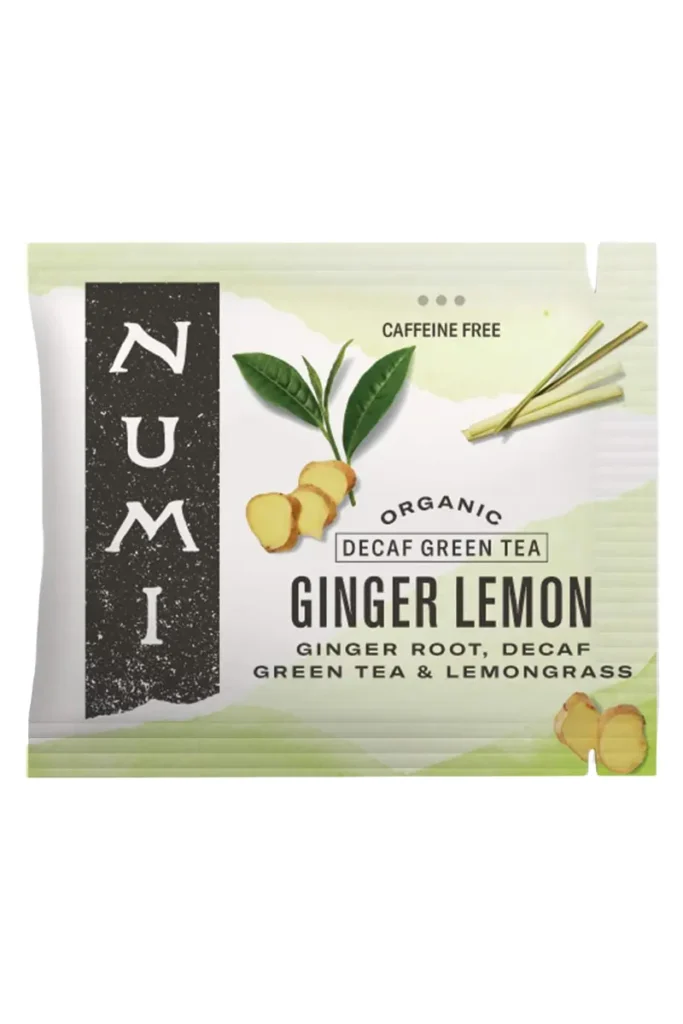5 Proven Health Benefits Of Ginger Tea And How To Make It
Learn the amazing health benefits of ginger tea! Discover the top five reasons to sip this nutritious beverage every day.

Ginger
Common Names: ginger
Latin Names: Zingiber officinale
Here is the list of health benefits of ginger tea:
Ginger Tea Benefits
Learn the amazing health benefits of ginger tea! Discover the top five reasons to sip this nutritious beverage every day.
For thousands of years, humans have used ginger to treat medical conditions and to add an unpleasant taste with a spicy kick to their food.
Ginger is a plant native to Asia that belongs to the Zingiberaceae family, and its edible root or stem is commonly used.
It is also an old natural medicine that has been used to treat a variety of diseases such as arthritis, diabetes, coughs, colds, and nausea (1).
Ginger is used in folk medicine in a variety of ways, including ginger tea. Boil the peeled root in water or milk to make ginger tea.
From soothing upset stomachs to boosting immunity, drinking ginger tea can help keep your body healthy and energized while enhancing your overall well-being.
If you're looking to feel and look better, or just spice up your life in general, adding ginger tea to your daily routine can bring a multitude of benefits. Discover the top five reasons why you should sip this nutritious beverage every day!

5 Health Benefits Of Ginger Tea
1. Ginger is good for Digestion
Ginger tea can help improve digestion and keep your system running smoothly.
The gingerol content in tea helps to reduce inflammation and encourage the release of digestive juices, making it easier to break down food.
Therefore, ginger tea benefits your gastrointestinal system by making food pass through the digestive system more easily.
According to one study, taking ginger capsules can help food move through your digestive system more quickly. "Ginger accelerates gastric emptying and stimulates antral contractions in healthy volunteers," the researchers concluded (2).
Ginger compounds have been shown in studies to have a positive effect on the gastric tract and potentially minimize spasms. It was proposed that chewing ginger, eating ginger candies, drinking ginger tea, or taking ginger root capsules could all help relieve gastrointestinal upset (3).
2. Relieves Nausea and Motion Sickness
The gingerol content of ginger tea has been shown to help relieve nausea, even for pregnant women suffering from morning sickness.
Ginger compounds have been shown in studies to have a positive effect on the gastric tract and potentially minimize spasms. It was proposed that chewing ginger, eating ginger candies, drinking ginger tea, or taking ginger root capsules could all help relieve gastrointestinal upset (4).
Ginger was discovered to be more effective than reference drugs in avoiding postoperative nausea and vomiting caused by general anesthesia in one study of 92 women (5, 6).
However, before using ginger after surgery, seek advice from a healthcare professional. It may interact with blood clotting, though research on this is still preliminary and more research is needed (7).
Here is an overview of 13 studies that explore the effectiveness of ginger in alleviating nausea and vomiting during pregnancy:
| Study | Treatment | Comparator | Duration (days) | Main findings |
|---|---|---|---|---|
| Fischer-Rasmussen, 1991 | 250 mg ginger powder capsules (4 × daily) | Placebo | 4 | Ginger was significantly more effective than the placebo |
| Vutyavanich, 2001 | 250 mg ginger powder capsules (4 × daily) | Placebo | 4 | Ginger was significantly more effective than the placebo |
| Keating, 2002 | 250 mg ginger syrup (4 × daily) | Placebo | 14 | Ginger was more effective than the placebo |
| Sripamote, 2003 | 500 mg ginger powder capsules (3 × daily) | 10 mg vitamin B6 capsules (3 × daily) | 3 | Ginger and vitamin B6 were both significantly more effective for treating NVP |
| Willets, 2003 | 125 mg ginger extract capsules (4 × daily) | Placebo | 4 | Ginger was significantly more effective than the placebo |
| Smith, 2004 | 350 mg ginger capsules (3 × daily) | 25 mg vitamin B6 capsules (3 × daily) | 21 | Ginger was equivalent to vitamin B6 for reducing nausea |
| Chittumma, 2007 | 325 mg ginger capsules × 2 (3 × daily) | 12.5 mg vitamin B6 capsules × 2 (3 × daily) | 4 | Ginger was significantly more effective than vitamin B6 |
| Pongrojpaw, 2007 | 500 mg ginger powder capsules (2 × daily) | 50 mg dimenhydrinate capsules (2 × daily) | 7 | Ginger was as effective as dimenhydrinate |
| Ensiyeh and Sakineh, 2009 | 500 mg ginger powder capsules (2 × daily) | 20 mg vitamin B6 capsules (2 × daily) | 4 | Ginger was significantly more effective than vitamin B6 |
| Ozgoli, 2009 | 250 mg ginger powder capsules (4 × daily) | Placebo | 4 | Ginger was significantly more effective than placebo |
| Basirat, 2009 | 500 mg ginger biscuits (5 × daily) | Placebo | 4 | Ginger was significantly more effective than placebo in relieving nausea, and effective at reducing vomiting |
| Mohammadbeigi, 2011 | 200 mg ginger essence capsules (3 × daily) | a. Placebo b. 10 mg Metoclopramide capsules (3 × daily) | 5 | Ginger was less effective than metoclopramide, but the difference was non-significant |
| Haji Seid Javadi, 2013 | 250 mg ginger capsules (4 × daily) | 40 mg vitamin B6 capsules (2 × daily) | 4 | Ginger was equivalent to vitamin B6 for reducing nausea |
3. Lowers Inflammation and Pain Relief
Drinking ginger tea may help reduce inflammation and provide relief from headaches or muscle pain.
For centuries, humans have used ginger to reduce inflammation, and science now supports this practice for certain applications (8).
According to studies, the biomolecules in ginger known as gingerol and shogaol help reduce the amount of pro-inflammatory markers (9).
Ginger has been studied in particular for its ability to relieve pain associated with knee osteoarthritis (10, 11).
If you drink ginger tea at the start of your period, it may help relieve cramps. According to research, it may be as effective as or more effective than over-the-counter pain relievers (12, 13).
4. It may aid in the management of weight and Blood Sugar
A large body of research suggests that eating ginger can help you lose weight and manage your blood sugar levels.
The gingerols in ginger tea are also believed to help remove heavy metals from your system, leaving you feeling more energized and healthy!
According to research, ginger may aid in weight management (14, 15).
✔️ Increasing thermogenesis (your body's production of heat), which aids in fat burning
✔️ Increasing fat breakdown for energy
✔️ Preventing fat storage
✔️ Stopping fat absorption
✔️ Supporting appetite control
Furthermore, ginger may help people with type 2 diabetes and obesity boost their blood sugar control by lowering fasting insulin levels, hemoglobin A1C, and triglycerides. Hemoglobin A1C is a measure of your blood sugar levels over the previous 2-3 months (16, 17, 18).
5. Ginger encourages healthy brain function
Because of its powerful antioxidant effect on the brain, ginger tea can also protect against cognitive neurodegenerative disorders.
The outcomes of oxidative stress can have a negative impact on brain function. As per research on the effects of ginger extract 6-shogaol, its anti-inflammatory potential can help prevent memory loss in dementia patients (19).
Other research has found that the antioxidants in ginger can help improve cognitive function in humans. In one study, middle-aged women took ginger extract supplements for two months. Researchers discovered that ginger improves memory and boosts working memos (20).
Best Time To Drink Ginger Tea
Best times to drink ginger tea:
- In the morning: Ginger tea can be a great pick-me-up to start your day. Ginger provides an energizing boost and the warm tea helps you wake up.
- Before meals: Having a cup of ginger tea 30 minutes before a meal can help stimulate your appetite and digestion.
- When feeling nauseous: Ginger tea is great for settling an upset stomach and relieving nausea. The ginger acts as an anti-inflammatory and can help reduce inflammation in the stomach.
- During cold and flu season: Ginger tea has anti-bacterial properties and can help boost your immunity. The ginger may help relieve congestion and the warm tea provides hydration.
Limiting Or Avoiding Ginger Consumption
Times to avoid or limit ginger tea:
- Before bedtime: Ginger tea may be too energizing and stimulating to have right before bed. The ginger and caffeine can make it harder to fall asleep.
- If you have ulcers or acid reflux: Ginger may irritate these conditions in some people. Check with your doctor before consuming ginger tea.
- If on blood thinners: Ginger may interact with some blood thinning medications. Consult your doctor about any potential interactions with your medications.
- During pregnancy: Some sources recommend limiting ginger intake during pregnancy. Check with your doctor for their recommendation based on your specific situation. Ginger in normal food amounts is likely fine, but may be best to limit concentrated sources like ginger tea.
- If dehydrated: Ginger tea is a diuretic, meaning it helps eliminate water from the body. So if you are already dehydrated, ginger tea could make it worse. Focus on non-caffeinated, non-diuretic fluids until you are properly hydrated again.
Ginger's Side Effects and Who Should Never Use It
Ginger consumption may cause mild gastrointestinal symptoms, which are the most commonly reported side effects, such as:
✔️Heartburn or reflux
✔️Belching
✔️Nausea
✔️Diarrhea
✔️Headache
✔️Abdominal discomfort
Other less common side effects may include:
✔️Rash
✔️Flushing
✔️Bad taste
However, when used properly, ginger is generally considered safe for consumption.
Ginger tea is a true powerhouse when it comes to health benefits, but it's important to note that it may not be a fit for everyone. In fact, there are certain groups of people who may want to limit or avoid consuming it altogether.
Women with polycystic ovary syndrome (PCOS) may need to avoid or limit ginger consumption.
Research has shown that consuming ginger may lead to a decrease in levels of follicle-stimulating hormone (FSH) and luteinizing hormone (LH). This finding could have implications for women with PCOS who are seeking to balance their hormones.
Individuals with irritable bowel syndrome (IBS) following a gluten-free diet should be cautious of potential sources of gluten in ginger-containing foods.
Ginger is a naturally gluten-free ingredient, but did you know that it's often used as a spice in dishes that may contain gluten?
If you have IBS and are following a gluten-free diet, it's important to keep an eye out for potential sources of gluten in foods that have ginger. Stay mindful and enjoy your meals with peace of mind!
Ginger Nutrition Facts
Ginger root is good for you because it contains vitamins and minerals as well as antioxidants.
100 g fresh, raw ginger root has the following nutritional value: (21)
| Nutrient | Amount |
|---|---|
| Calories | 80 |
| Carbohydrates | 17.7 g |
| Protein | 1.82 g |
| Fiber | 2 g |
| Sugar | 1.7 g |
| Calcium | 16 mg |
| Magnesium | 43 mg |
| Potassium | 415 mg |
| Zinc | 13 mg |
| Vitamin C | 5 mg |
According to the book Herbal Medicine, ginger contains at least 115 bioactive molecules.
Gingerols and shogaols are antioxidants that have anti-inflammatory, anti-nausea, and anticancer properties. Ground ginger and ginger root can also help avoid heart disease (22).
Fresh ginger contains a higher amount of gingerols, while dry ginger has a higher concentration of shogaols, which are the dehydration products of gingerols.
Ginger is more than just a spice, it's a powerhouse of beneficial compounds! Fresh ginger rhizome is packed with at least 31 gingerol-related compounds, all waiting to be unlocked through extraction.
Did you know that the amount of ginger present in a sample can differ based on various factors?
These factors include the country where it was grown, the commercial processor involved, and whether it is fresh, dried, or processed.
Among the bioactive pungent components found in Jamaican ginger, namely [6]-, [8]-, and [10]-gingerols, and [6]-shogaol, [6]-gingerol has been identified as the most prevalent bioactive compound in the majority of the oleoresin samples analyzed.
Upon observation, it was noted that the active components exhibit a wide range of variation in their content, ranging from minuscule amounts to a few milligrams per gram.
The recommended daily serving size varies between 250 mg to 4.8 g.
Studies have shown that ginger contains multiple bioactive compounds, however, the lack of standardization in its contents makes it difficult to determine the appropriate dosage range.
Traditional Medicinals Organic Ginger Tea
Pack of 6
Price: $0.22 per Ounce
- Climate Pledge Friendly
- USDA Organic
- Gluten-Free
- B Certified
- FAIRTRADE Certified, FAIRWILD
- Non-GMO, Kosher
- Healthy Digestion

How To Make Ginger Tea
Here are the steps to make ginger tea:
- Peel and grate about an inch of fresh ginger root. You can also use pre-grated ginger from the grocery store. For a milder tea, use less ginger. For a stronger tea, use more.
- Boil some water. Bring 4-6 cups of water to a boil in a saucepan or kettle.
- Add the grated ginger to a teapot or heatproof pitcher. For extra flavor, you can also add a cinnamon stick, a few whole cloves, or a slice of lemon.
- Pour the boiling water over the ginger and spices. Cover and let steep for 3 to 5 minutes based on how strong you want the flavor.
- Strain and sweeten (optional). Strain the tea through a fine mesh strainer into mugs. You can add a little honey and lemon juice for extra flavor and sweetness.
- Enjoy your ginger tea. Ginger tea is best consumed when freshly made. You can refrigerate any leftover tea, but it is best served within a day. The ginger and spices will continue to steep and strengthen in flavor as they sit.
- For iced ginger tea: Make a strong ginger tea concentrate and chill before pouring over ice. You can also add ginger tea to sparkling water for a refreshing ginger ale alternative.
- You can reuse the same ginger pieces to make 2-3 rounds of tea. The ginger flavor will diminish with each use, so you may need to use more ginger for subsequent batches. Compost the ginger once done.
Frequently Asked Questions
What are the 5 ginger tea benefits?
What happens if you drink ginger tea every day?
What are the best ginger tea benefits?
Does ginger reduce belly fat?
What does ginger tea do to your body?
Is it good to drink ginger tea every day?
Numi Organic Tea Decaf Ginger Lemon
100 Count
Price: $0.33 per Count
- Climate Pledge Friendly
- USDA Organic
- Climate Neutral Certified
- B Certified
- Fair Trade Certified,
- Plant-Based Tea Wrapper

Review date not set.
How we reviewed this article:
Latest on:





